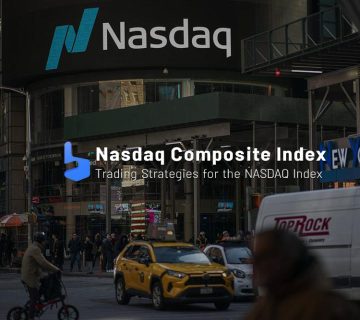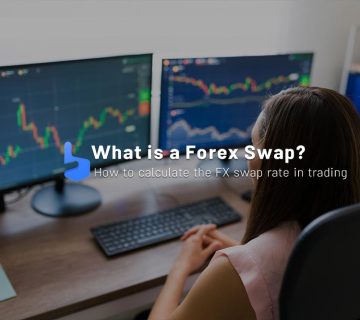What you are about to read:
Artificial Intelligence in forex is increasingly used for data analysis, predictions, and automating trading decisions. With advancements in machine learning and natural language processing (NLP), Forex Trading with AI can be utilized to analyze vast amounts of real-time data and identify patterns and trends that may be challenging for traders to discern. In this article, we will thoroughly examine this topic with Brokerland.
Forex Trading with AI
AI algorithms can be trained on historical market data to predict future market movements and assist traders in making more informed decisions. For instance, Artificial Intelligence in forex can be used to predict stock prices, forecast economic indicators like the dollar index, or identify lucrative trading opportunities.
Artificial Intelligence in forex, like in other financial markets, can be employed for data analysis, predictions, and automating trading decisions. Forex is a decentralized market that operates 24 hours a day, generating extensive data on price changes, economic indicators, and news events. AI algorithms can be trained on this data to identify patterns and predict future market movements.
Apart from the aforementioned functionalities, one of the other key applications of Forex Trading with AI is the development of trading strategies. Machine learning algorithms can be used to analyze historical market data and identify patterns that can be utilized to develop profitable trading strategies. For example, Artificial Intelligence in forex can be used to identify correlations between different currency pairs or predict the impact of economic indicators on exchange rates.
Algorithmic trading is another use of AI in Forex. This method involves automating trading decisions based on predefined rules or strategies. It is often referred to as algorithmic trading or algo trading. AI algorithms can be programmed to execute trades based on specific criteria such as price changes, technical indicators, or significant forex news. This can help traders execute trades more efficiently and take advantage of market opportunities.
How can we use Artificial Intelligence in forex?
Traders can leverage AI in Forex to generate income through the following methods:
Development and Testing of Trading Strategies: AI in Forex can be used to analyze historical market data and identify patterns for the development of profitable trading strategies. Traders can test these strategies using past data to determine their effectiveness before applying them to live trades.
Market Movement Predictions: Another way of forex trading with AI, is to analyze vast amounts of data and predict future market movements. Traders can use these predictions for more informed trading decisions and capitalize on market opportunities.
Automating Trading Decisions: AI algorithms can automate trading decisions based on predefined rules or strategies. Traders can utilize this technology for automating their trading decisions, leading to more efficient trade execution.
News and Sentiment Analysis: AI in Forex can analyze news articles and social media posts to identify sentiments and predict their impact on market movements. Traders can use this information for sentiment analysis.
Risk Management: Artificial Intelligence can be employed for risk management by setting different types of forex orders like stop-loss and take-profit based on predefined risk parameters.
Portfolio Optimization: Forex Trading with AI can optimize a trader’s portfolio by identifying the most profitable trading opportunities and allocating capital based on them.
It’s crucial to note that while Artificial Intelligence in Forex can be a powerful tool for traders, it is not a guaranteed income source. Traders should use AI in conjunction with other tools and strategies, practice proper risk management techniques, and stay updated with the latest advancements in AI. Additionally, AI algorithms can be susceptible to biases and errors, so traders should continuously update and refine their strategies over time.
What is a Forex Trading Robot?
A Forex trading robot, or forex expert advisor, is an informal term for algorithmic software that automates Forex trades based on predefined logic. These “trading robots” are programmed to execute buy and sell orders for currency pairs based on specific signals generated by price action, an indicator, or any other criterion chosen by the trader.
They integrate through Application Programming Interfaces (APIs), allowing them to receive inputs from market monitoring software and then issue buy and sell commands through your forex broker. Essentially, it allows the program to execute its trading strategies.
Automated trading programs can be programmed by traders with coding skills or, depending on the platform, integrated into your online brokerage account. Robo-trading can offer two main advantages: eliminating human emotions from your trading decisions and executing many trades rapidly. Forex traders often use trading robots and AI in forex for these reasons.
However, the use of AI trading programs in Forex comes with challenges. Algorithmic software is not always adaptive, meaning changes in market conditions may interfere with your strategy’s logic. Using a strategy that works well in a ranging market may yield unfavorable results, and this can happen quickly due to numerous trading opportunities. Forex trading robots are also continuously active, and without monitoring, this can have a detrimental impact on a trader’s account.
What Should Traders Know and Learn Before Using AI in Forex?
For Forex trading with AI, traders should know and learn the following:
Understanding Forex Trading
Traders need to learn forex to have a comprehensive understanding of Forex trading, including market dynamics, trading strategies, and risk management techniques. While AI in Forex can be a powerful tool, it is not a substitute for fundamental market knowledge.
Understanding AI Technology
Traders should have an initial understanding of AI technology, including machine learning algorithms, natural language processing (NLP), and predictive analytics. Traders should also comprehend the strengths and limitations of AI algorithms in Forex and how to evaluate their effectiveness.
Data Analysis Skills
Traders need strong data analysis skills for forex trading with AI. This includes proficiency in statistical analysis, data visualization, and preprocessing data.
Programming Skills to use AI in forex
Traders should possess some programming skills to implement Artificial Intelligence in Forex and their trading strategies. This includes knowledge of programming languages like Python and R, as well as familiarity with libraries and frameworks such as TensorFlow and PyTorch.
Risk Management Skills
Traders must have a strong understanding of risk management techniques to effectively use AI in Forex. This involves setting stop-loss and take-profit orders and position sizing based on predefined risk parameters.
Backtesting Skills for forex trading with AI
Traders also need skills in backtesting strategies using historical market data to evaluate their effectiveness. This includes skills in data analysis, statistical modeling, and programming.
Continuous Learning
Traders should be committed to continuous learning and staying updated with the latest advancements in Forex trading with AI. This involves participating in industry conferences, reading research papers, and engaging in forums and online communities.
A Roadmap for Developing an AI Engine in Forex
Developing an AI engine for trading in the Forex market can be a complex and challenging task that requires a strong understanding of machine learning algorithms and Forex trading principles. Here is a general roadmap to help you get started:
- Learn Forex Trading Principles: Before developing an AI engine for Forex trading, having a strong understanding of Forex trading principles, including technical analysis, fundamental analysis, risk management, and trading strategies, is essential. This helps you identify the key factors to consider when developing an engine for Forex trading with AI.
- Choose a Programming Language: Several programming languages are commonly used in machine learning, including Python, R, and MATLAB. Choose a language that you are comfortable with or have experience in, and that has a wide range of libraries and tools for machine learning.
- Collect and Preprocess Data: Collect historical Forex market data, including price movements, trading volumes, and other relevant indicators. Preprocess the data to make it suitable for machine learning algorithms. This may involve data cleaning, transforming it into numerical features, and scaling features to improve the accuracy of the AI engine.
- Choose a Machine Learning Algorithm: There are numerous machine learning algorithms available for Forex trading with AI, including supervised and unsupervised learning algorithms. Choose an algorithm that aligns with your strategy and trading data, and adjust the algorithm’s parameters to optimize its performance.
- Train and Test the AI Engine: Use historical data to train the AI engine in Forex and evaluate its performance using backtesting techniques. Regularly monitor the AI engine’s performance based on performance metrics, including accuracy, profitability, and risk management. Continuously refine and improve the engine.
- Implement the AI Engine in Forex: Once you have developed a profitable and robust AI engine, implement it on a trading platform that supports automated trading. This may involve integrating the AI engine with a trading API or using a third-party platform that facilitates automated trading.
- Monitoring and Evaluation: Continuously monitor the performance of the AI engine in Forex and make necessary adjustments to enhance its accuracy and profitability. Regularly evaluate the AI engine’s performance compared to the market and other trading strategies to ensure its effectiveness.
It is crucial to note that developing an AI engine in Forex is a complex and challenging task that requires significant knowledge and experience in machine learning and Forex trading. Additionally, when using AI in forex trading, it is essential to practice proper risk management techniques, as no trading strategy is error-proof.
Conclusion
In summary, artificial intelligence in forex can be a powerful tool for traders as it can assist in pattern recognition, prediction, and automating trading decisions. However, it is important to understand that AI in Forex is not a one-size-fits-all solution for all market challenges.
Like any tool, it has its limitations, and its effectiveness depends on the quality of data and algorithms used. Additionally, AI algorithms in Forex can be susceptible to biases and errors, which can lead to incorrect predictions or trading decisions.
Therefore, for traders, it is important to use AI in conjunction with other tools and strategies and also employ proper risk management techniques. Traders should stay updated with the latest advancements in AI and continuously refine their skills and strategies over time.
Traders should have a comprehensive understanding of Forex trading, AI technology, and skills in data analysis, programming, risk management, and backtesting before utilizing Forex trading with AI. Moreover, practicing appropriate risk management techniques is crucial, as no trading strategy is flawless.












